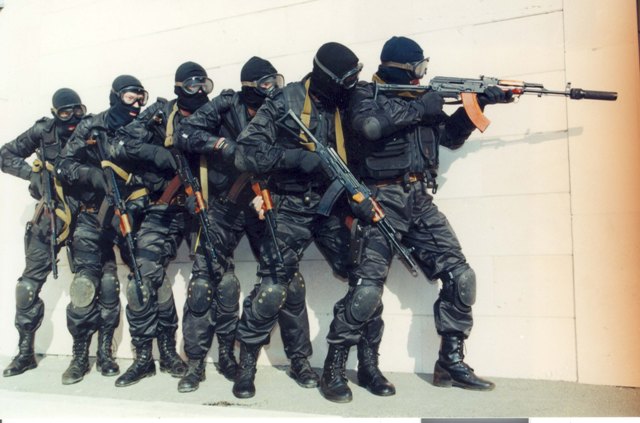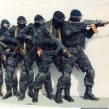
Bomb Blast Connected to Terrorist Activity in Kazakhstan Kills Eight People in Almaty Province
Publication: Eurasia Daily Monitor Volume: 9 Issue: 138
By:

On July 11, an explosion occurred at a house in the village of Tausamal in Almaty province in Kazakhstan. Eight men (including four children) were killed. Prosecutors in Kazakhstan’s Almaty region launched a criminal inquiry on July 12 into the explosion. Criminal cases were opened under Article 24 Part One (plotting to commit a terrorist act) of the Penal Code and under Article 233 (terrorism) of the Penal Code. The cases could be handed over to the republic’s National Security Committee. The area around the house where the blast occurred was cordoned off. A search through the rubble led to the discovery of firearms, police ammunition and Muslim literature (The Kazakh Telegraph Agency, July 13).
The President of Kazakhstan Nursultan Nazarbayev without delay reacted to the explosion. “The law-enforcement agencies are responsible for the preservation of stability and rule of law in the country. As the President of the country, I am not satisfied with the work done by the law-enforcement agencies and the National Security Committee, in particular. Those efforts that we are making are not effective enough,” President Nazarbayev said at a counter-terrorism meeting in Astana on July 12. At the end of the meeting, Nazarbayev ordered that measures be taken to monitor terrorist threats, better coordinate the work of various law enforcement bodies, improve the skills of their personnel and tighten the security of sites vulnerable to terrorist attacks. (Kazakhstan Today, July 12).
The Head of State also listened to Prime Minister Karim Massimov’s report on the results of the first stage of an evaluation of the work of senior officials of the central and regional law enforcement forces. According to Massimov’s report, 20 percent of law enforcement officers had not passed the state-wide attestation process, and 10 percent resigned before it started (Kazakhstan Today, July 12). The Kazakhstani President initiated the reform of the security and law enforcement system in 2010, with the aim of making the country’s law enforcement agencies meet international standards. It is expected that significant structural changes will take place in the Interior Ministry, the judiciary system, the national security committee and police.
Prior to the wave of terrorist attacks in 2011, the problem of Islamic radicalism in Kazakhstan was less ubiquitous than in the other Central Asian republics. But now, the situation is changing dramatically. From 2011-2012, more than one hundred criminal acts connected with terrorism and extremism occurred in Kazakhstan. A few dozen civilians and policemen were killed by terrorists. The authorities are now officially beginning to recognize the existence of illegal armed groups operating within the country.
According to Kozy-Korpesh Djanburchin, a deputy secretary of the security council of Kazakhstan, around 10 percent of the country’s population is composed of highly religious people who strictly follow religious practices, while the number of those willing to learn more about religion and engage in religious practices is ever growing. Even though an increasingly religious population is not a source of potential conflict per se, “there is a risk that some of the international terrorist and religious-extremist organizations are taking purposeful steps to secure a lasting presence on the territory of Central Asia, including our country,” Djanburchin explained. According to Djanburchin, at least 300 people engaged in terrorism and extremism have been convicted in this country since 2005 (Kazakhstan Today, July 12).
Evgeniy Zhovtis, the leader of the Kazakhstan International Bureau for Human Rights and Rule of Law sees clear parallels between the current situation in Kazakhstan and the situation at the beginning of the 1990s in Uzbekistan. “Social problems and corruption provoke religious extremism. As in Uzbekistan, the Kazakhstani authorities are starting to severely crack down on religious radicals.” As Zhovtis noted, about five years ago, the authorities quite rarely arrested Islamic radicals, but now this is the usual practice. The human rights defender believes that only a few convicted Islamic radicals are really terrorists. He argues that the authorities established an isolated detention center in Chimkent province (southern Kazakhstan). “There is a pretrial detention center for Islamic radicals arrested throughout Kazakhstan. The authorities established it because [extremist] Islamic propaganda turned out to be rather successful among convicts [in the country’s regular prison system],” Zhovtis told Jamestown on July 14.
“The external factor, that is, help originating from abroad going to Kazakhstan’s terrorists – is not the main cause of terrorist activity in Kazakhstan,” Dr. Aleksey Malashenko, the leading researcher at the Carnegie Moscow Center, explained to Jamestown on July 17. According to Dr. Malashenko, the external factor is very serious for Uzbekistan, Tajikistan and partly Kyrgyzstan. A lot of men from these republics were trained in Islamic radical military camps in Afghanistan and North Pakistan. But as the researcher believes, only a few Kazakhs were trained in Afghanistan. “Of more importance for the growth of religious extremism in Kazakhstan is social tension and, perhaps, the competition between different Kazakh tribes. Now the most tense situation is in western Kazakhstan – where the Adai tribe lives. The Zhanaozen rebellion happened, exactly, in the Adai area,” Malashenko noted.
Analyst and director of the Fergana news agency Daniil Kislov holds a similar view. “The activity of terrorists in Kazakhstan is explained merely by internal factors. This is corruption, and the enormous social inequality and the growth of interference of Kazakh authorities in the life of believers” Daniil Kislov argued in an interview with Jamestown on July 18.
Dr. Dosim Satpaev, the director of the Almaty-based think-tank Risk Assessment Group, disagrees with Dr. Malashenko and Mr. Kislov, however. “During the last twenty years, Kazakh Muslims have extensively been in contact with Muslims from abroad. Many Kazakhstanis studied in Islamic universities in Egypt, Turkey and Saudi Arabia. Some of them believe that an Islamic state is the optimal model for Kazakhstan. Some Kazakhstanis fought against the international coalition in Afghanistan and some of them returned home” Dr. Satpaev told Jamestown on July 18. According to the researcher, this external factor for Kazakhstan could become more important in the future. “The influence of foreign Islamic radicals is much higher in Uzbekistan and Tajikistan than in Kazakhstan. But if foreign Islamic radicals manage to destabilize the situation in Tajikistan and Kyrgyzstan, then after that they will concentrate their efforts on Kazakhstan,” Satpaev asserted.
However, as Dr. Satpaev admits, for now the importance of the external factor for Kazakhstan’s internal security should not be overestimated. “After the collapse of the Soviet Union, an ideological vacuum developed in Kazakhstan. People were disappointed with the communist system, but they are not happy with the new system either. Many people are starting to identify corruption and social inequality with capitalism, and many of them are beginning to think that only the Islamic model can resolve social problems. These views generate serious preconditions for Islamic terrorism,” Dosim Satpaev noted. Thus, ongoing systemic domestic reforms, carried out in parallel with more effective policing, will clearly be vital in order to tackle the threat of extremism in Kazakhstan before it becomes a more widespread problem in the republic.




